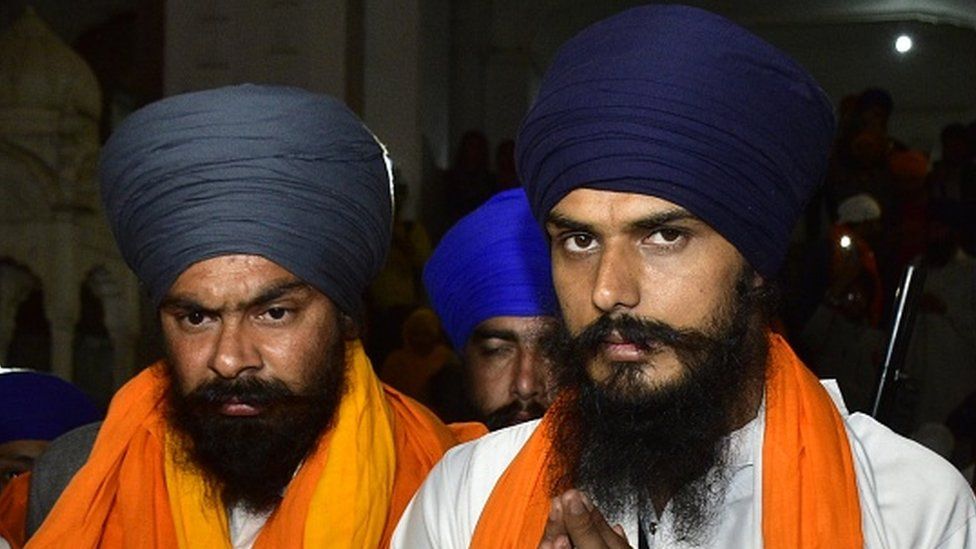A Punjab police station in northern India was overrun by hundreds of Amritpal Singh's followers last week, who were calling for the release of a detained aide.
The group of irate young men, many of whom were armed with guns and swords, overpowered barricades and remained there until they were given assurances that the aide would be released. Later, police officers claimed that the crowd was using a copy of the Guru Granth Sahib, the revered holy text of the Sikhs, as a shield and that this prevented them from dispersing the crowd.
The circumstances made Singh, who is about 30 years old and claims to support the Khalistan movement for a separate Sikh homeland, a household name.
Concerns were also raised by Singh's appearance, which was similar to the preacher Jarnail Singh Bhindranwale, who was charged by the Indian government with organizing an armed rebellion for a separate Sikh homeland in the 1980s. He died in the divisive Operation Blue Star of the Indian Army in 1984.
The insurgency, which lasted for about ten years, resulted in the deaths of thousands of people. Insurgents targeted prominent figures as well as common people, and numerous young Sikhs were killed during police operations, some of which Indian courts later ruled were staged. The effects of that violence can still be seen in Punjab.
Shashi Kant, a former director general of police in Punjab, claims that what is happening there makes one wonder if we are about to return to the dark days of militancy. "There is a genuine fearful atmosphere. ".
Singh's popularity, however, has been criticized by some as being exaggerated.
"Although the sentiment of separatism never completely disappeared, it did lose support from the general public in the 1990s. People like Amritpal Singh and their call for a violent movement are not supported by everyone in the state. Prof. Parminder Singh, a professor at the state's Guru Nanak Dev University, notes that it is still a very small portion of the population.
According to Punjab Chief Minister Bhagwant Mann, despite efforts to undermine the "special bond" between communities, "everyone lives in harmony" in the state.
Singh's supporters numbering 1,000, he claimed, "do not speak for Punjab.".
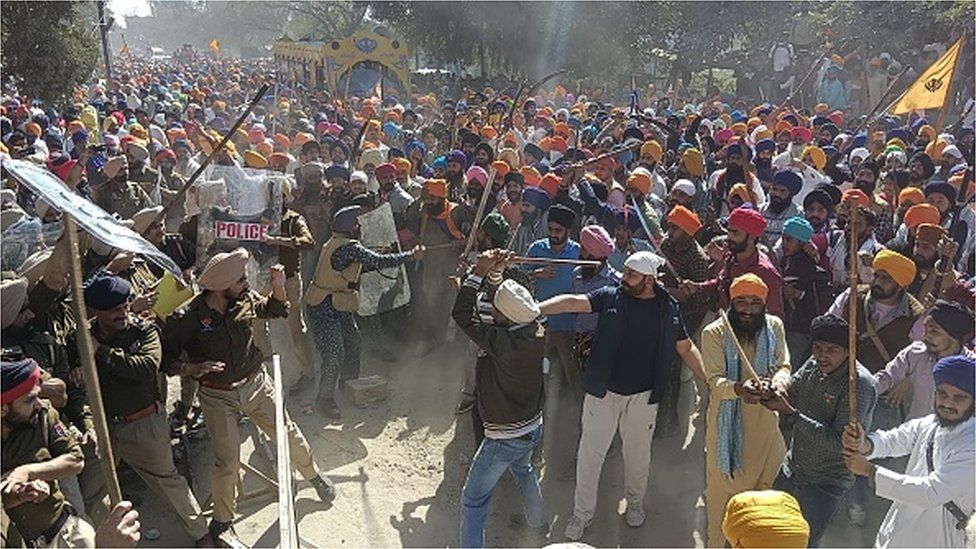
Singh's early years are not well known. He was born and raised in Jallupur Khera, Punjab's Amritsar district, and relocated to Dubai in 2012 to work in his family's transport company.
According to his LinkedIn profile, he holds a mechanical engineering degree from a Punjabi university and has experience as a "operational manager" for a cargo company.
His popularity was reportedly limited to social media for a long time, where his ideas about Sikh statehood and unity found a lot of traction. .
He traveled to India from Dubai in August of last year and appeared noticeably different from earlier pictures where his hair and beard were neatly styled.
He now had a beard that was long and flowing, unshorn hair that was pulled back into a blue turban, a steel bracelet on his wrist, and a small sacred dagger called a kirpan hanging from his waist.
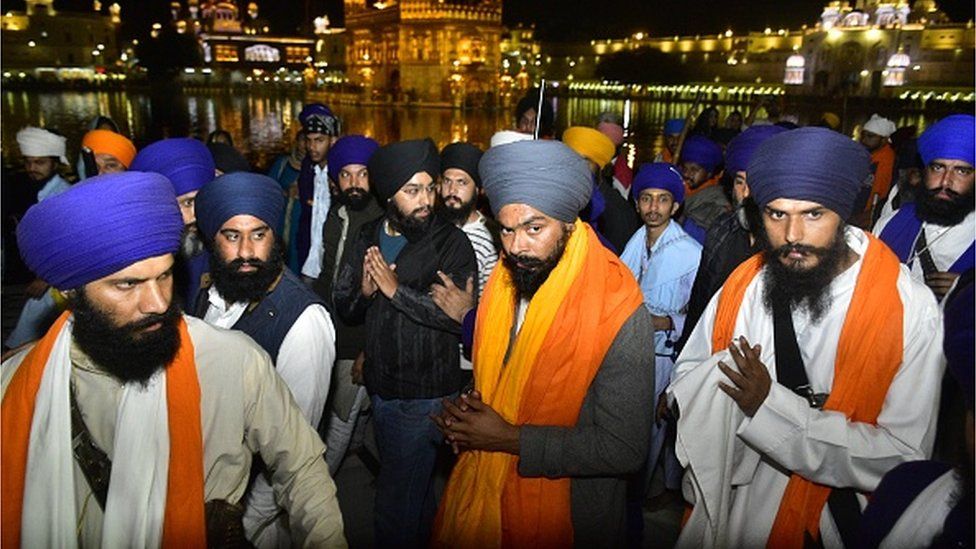
A month later, Singh was named the leader of Waris Punjab De (Heirs of Punjab), a group founded by actor and activist Deep Sidhu, who passed away in a car accident the previous year. Sidhu was detained in connection with violence at a protest for farmers.
The ceremony took place in Rode, the birthplace of Bhindranwale, and thousands of people attended.
Many of Singh's supporters liken him to Bhindranwale, whom he refers to as an "inspiration.".
In his speeches, Singh imitates Bhindranwale and his extreme viewpoints, openly advocating for a separate state for Sikhs and arguing that it is the only "permanent solution" to the issues facing Punjab, including water disputes, drug abuse, and the deterioration of Punjabi culture.
Singh personally rejects the comparison, saying, "I am not even equal to the dust of his feet. He told The Indian Express newspaper last year, "I only walk the path shown by him.
Given Singh's age, Prof. Ashutosh, a political scientist who teaches at the state's Panjab University, calls his sudden rise to notoriety "mysterious.".
However, he continues, Singh has been successful in exploiting Sikh fears by drawing comparisons between the notion of their sovereignty and the Hindu nationalist identity.
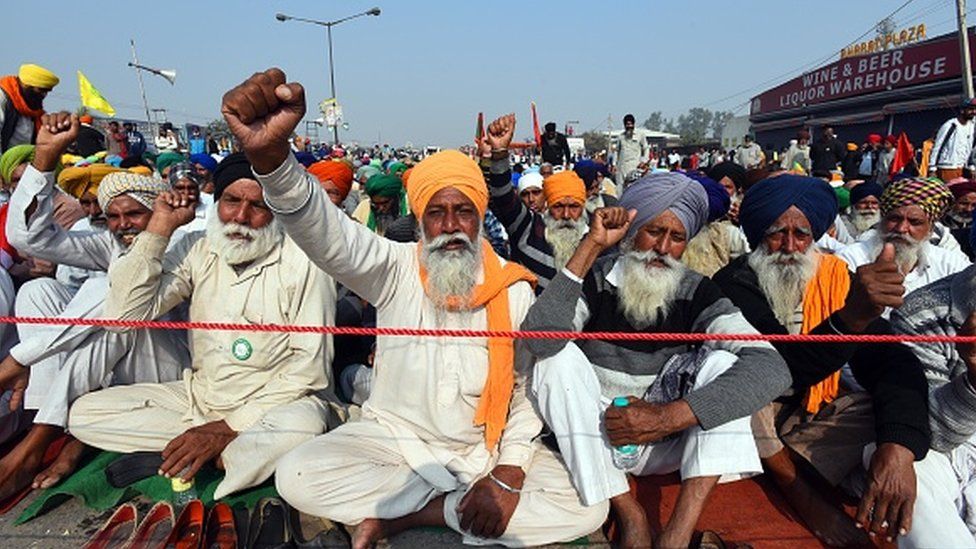
The breadbasket of India, Punjab, is still a relatively affluent state. However, according to experts, a lingering unemployment issue and a farming crisis have diminished the state's social and economic standing.
Some Sikhs feel the need for a leader who speaks about the injustices done to them and could represent their interests and problems because the Bharatiya Janata Party, which is in power, has supporters who are calling for a Hindu nation, Prof. Ashutosh says.
Prof. Khalid Mohammad, a professor at Panjab University, claims that Singh's popularity has been greatly influenced by social media because it has made it easier for him to "connect with the masses.".
Singh oversaw a month-long religious procession in November to promote Sikh baptization (the Amrit ceremony), abstain from drug use, which is a major issue in Punjab, and give up outdated traditions like dowry and caste-based prejudice.
Following Singh's remark that people should only sit on the floor when the Guru Granth Sahib is present, his supporters made headlines a month later for destroying furniture at a gurudwara.
According to Prof. Parminder Singh, the dissatisfaction of many young people in Punjab is another factor in Singh's surge in popularity.
"There are many young people in Punjab who are not well-off, not very educated, unable to find employment, and lacking the resources to travel abroad. Many of them might have turned to this brand of religious fundamentalism, the author speculates.
In his speeches, Singh frequently makes the case that the demand for Khalistan is wholly legitimate. Additionally, he seems to have a strong appeal for his supporters.
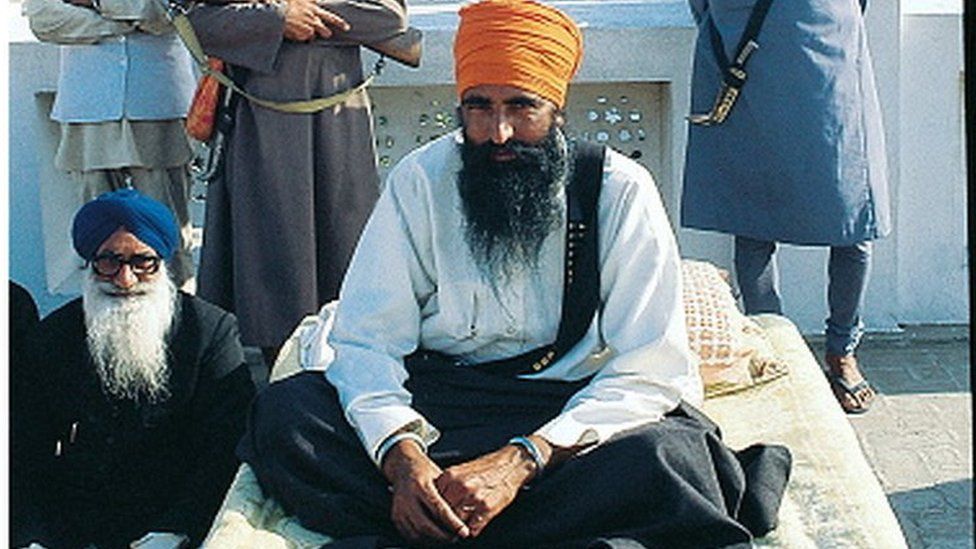
But more than anything, the state's violent past serves as a chilling reminder of his unexpected popularity.
Years after the bloodshed, Punjab has largely returned to normal, with its cities once more teeming with activity.
Currently, some people fear that the state may experience unrest once more.
An ex-senior Punjab police officer who joined the department in the 1980s told the BBC that he had previously witnessed numerous attacks on police stations. But this is the first time the police have appeared to be this helpless, he adds.
Prof. Parminder Singh also notes that Singh has been moving around Punjab with swords and firearms for the past few months without having a case brought against him.
"In general, this trend is risky and shouldn't be allowed to grow. Punjab would otherwise experience a severe phase of crisis.
. "

